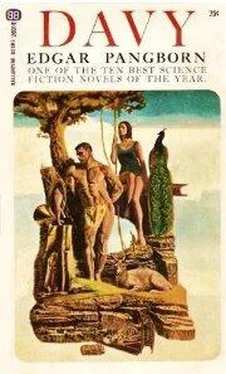I knew some unhappy moments when we went away from the cave for good that morning. For one thing I saw few opportunities ahead for playing with Vilet; with the feeling of losing her, I even imagined a little that I was in love with her — her common sense would have taken care of that if I had spoken of it; since I didn’t, my own brains were obliged to handle it, and did so moderately well. Leaving the cave was in many other ways a good-bye—
I know: so is any moment. What happened to the jo who was breathing with your lungs five minutes ago? — or don’t you care?
We spent most of the day in cautious travel through the woods, until we could be sure we were well beyond the village that had been so good as to furnish us with respectable clothes. I did wish I might have learned what happened there when Lurette crashed in shrieking about rape and fire, but I never shall know, so what the hell, write that story yourself if you’re man enough. Then we altered our course, and came out on the Northeast Road at a place where it was climbing a considerable rise, the longer and steeper part still ahead of us. The sun stood behind us in the west; everything lay in a hot bright hush. We saw a few lines of smoke here and there in the south, distant villages. Nothing was moving on the road as we stepped out there in our good clothes — white freeman’s loin-rags, decent brown shirts, Vilet in the remodeled yellow smock. And we heard nothing — no voice, no creak of cart-wheels, no sound of cattle or horse or man. On the other side of the rise ahead of us there could be anything.
Jed asked: “What day is it?”
Bedam if we knew. I said Thursday, but Jed wasn’t sure, and started fretting that he might have let a Friday morning go by without special prayers. He was for having them then and there by the roadside, but I said: “Wait, and hush the clack a minute — I want to listen.”
I wanted something more than listening. I motioned them to stay where they were, and stepped a short way up the road to get clear of the human smell and study the breeze. Even then I wasn’t sure.
I wished something human might join us, but the hot afternoon was quiet as a sleep. It happens Jed was right — the day was a Friday, the day God is said to have rested from the labors of creation, when all but the most necessary travel is forbidden or at least frowned on. And the war was still a fact, discouraging travel, though nothing in the summer air could make you think of it. Finally, it was late enough in the day so that any sensible traveler would be thinking of supper-time behind stockade walls.
When I rejoined the others Sam asked me carefully: “Did you catch it?”
“I think so.” I saw Jed didn’t understand. “We best move right on, keep close together till we come to a settlement. I think I smell tiger.”
How steep was that sunny slope, how very long! I wanted us to climb it quietly, and Sam urged that too, but Jed thought best to pray, and when Sam asked him to avoid making noise and save his breath, Jed merely looked forgiving and went on praying, no help for it.
The road approached the illusion of an ending at open sky. You may see that, wherever a road mounts a hill, and you think of a drop into nothing or of sudden dying. If I could return to that strip of road today and travel it without alarm, without the faint ammoniac reek of the thing that was somewhere near us unheard, I suppose it would seem an ordinary climb. It was not so steep that a single ox couldn’t have hauled a heavy cart to the summit — I dare say that was the standard of adequate road-building in most parts of Moha. Yet whenever the smell seemed to strengthen, or I imagined some hint of tawny motion among the trees at my left, I felt like a wingless bug climbing a wall.
Nor was that piece of road so very long, really — a quarter-mile perhaps, or less. The sun was not noticeably lower when we reached the crest of the rise-we did reach it, all four of us alive-and looked down, and saw a thing that might save us from the tiger, or might not.
We saw a stockaded village, the walls fairly well made, and it stood boldly at the edge of the road, no hideaway wilderness thing but civilized, respectable, important in its own right. It lay far enough below us in the valley so that we could see all but the north end of it, which was hidden by forest growth coming close to the stockade. We saw behind the palings a graceful church spire, the usual design of an upright bar rising from the wheel, and an orderly array of rooftops, including those of quite a few two-story dwellings. Next to the road, on our side, was a generous area of cleared land, with corn-patches, and black spots that showed where they maintained guard-fires at night to keep the deer, bison, woods buffalo and small creatures from ruining their plantings. Far down, yes, nearly half a mile, and for much of that distance, until we reached the corn planting, there would still be trees and brush creating a mystery at our left.
As we began the descent, Jed Sever would not look to either side of the road, not into the trees nor away into the lovely sunshine and green slopes of the southern side. He trusted instinct to place his feet for him, and looked upward toward his God, asking forgiveness for the sins of all of us. He was asking also that if the beast should strike it might take him first and not one of his friends — for he, though an even more wretched sinner perhaps beyond hope of salvation, was nevertheless more prepared in his mind for judgment and the wrath to come. “And if it be thy will,” he said, “let their sins be upon me, Abraham chosen of God, Spokesman, Redeemer, and not upon them, but let ’em be washed clean in my blood [18] The Holy Murcan Church apparently adopted the fantasy of vicarious atonement from Old-Time Christianity with one curious modification. According to the modern creed, any saintly man, not only Christ or Abraham, can take on himself the sins of others if the Lord agrees to the deal. Like modern believers, the Christians of Old Time seem never to have felt anything repellent or atrocious in the doctrine that a man could get a free ride into heaven on the suffering and death of another. The parallel to primitive god-killing rituals was of course noted only by scholars. — Dion M. M.
forever and ever amen.”
Jed also tried to motion poor Vilet away from him to the other, probably safer side of the road, walking himself nearest to the forest cover, the sweat pouring from his forehead like tears. His big hands swung idle with no look of readiness for sword-work.
I can remember the distress his prayer gave me, in spite of my own fear and alertness. It seemed to me, especially in my new and bewildering acquaintance with heresy, that if there was one thing above all I could let no one else carry for me, it was my sins. Today I can discover no sin in anything except cruelty and its variations, and this for reasons that have nothing to do with religion, but on that day I was yet a long way from such opinions.
As we continued down the other side of that hill, the tiger scent diminished. I think it was some shift in the barely perceptible currents of the air. He was present but he did not strike. We moved on down the road — passing the forest cover at our left, reaching the corn plantings, passing them, approaching the open region and the village gate, and he did not strike.
From within the village came the sweet jangling of triple bells. Often they are made of the best bronze from Katskll or Penn — the Church can afford it — and the makers try to cast each group so that it will sound a major triad with the fifth in the bass. The third, struck last, floats in the high treble toward a tranquillity resembling peace, and the overtones play with a hundred rainbows. These village bells were announcing five o’clock: “Time to quit work and pray and have supper.”
Читать дальше












